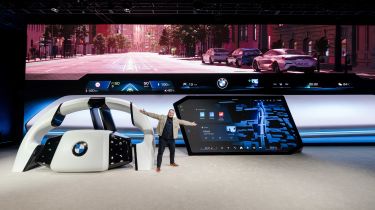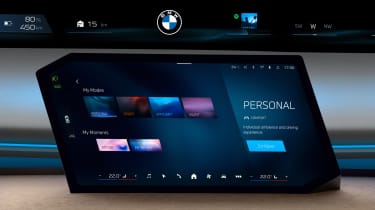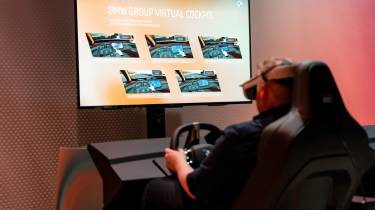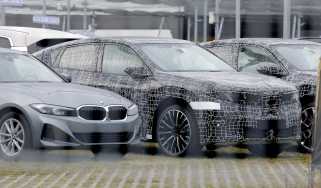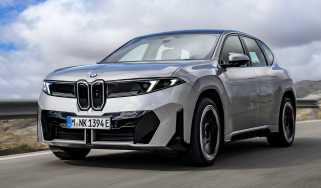New BMW Panoramic iDrive revealed: latest iteration of the tech that changed motoring
BMW’s radical new interior design focuses on the principle of ‘eyes on the road, hands on the wheel’ driving, and features a pillar-to-pillar instrument display
BMW iDrive revolutionised the way modern drivers interact with their cars when it was introduced to the world in 2001. However after more than two decades of gradual evolution, the brand has decided it’s time to start anew and fundamentally reinvented iDrive, guided by the philosophy of “eyes on the road, hands on the wheel.”
BMW’s newest driver-focused cockpit design, dubbed BMW Panoramic iDrive, will make its debut in the new iX3 electric SUV that’s being readied for launch towards the end of this year. It’s also the first of a momentous, all-new model generation referred to as the ‘Neue Klasse’, all of which will feature the set-up you see here.
There are four key components to the latest iteration of iDrive: the ‘Panoramic Vision’ display – which takes the traditional instrument cluster to another level – a huge 17.9-inch central touchscreen, a unique four-spoke multifunction steering wheel and a 3D head-up display, although the latter won’t be standard on every model.
Fresh hardware deserves cutting-edge software, of course, and not only was BMW’s new Operating System X created entirely in-house, it’s supposed to serve as an exemplar of software-defined vehicle (SDV) development.
Normally when new tech like this is presented for the first time on its own, we just get to see some animations of how it's supposed to look. However, BMW must have heard immersive experiences are trendy at the moment, because it built an enormous mock-up of the new Panoramic iDrive set-up that helped us understand how everything is designed to work together holistically.
The most radical change, compared to every BMW that’s come before, is the Panoramic Vision. It’s essentially a massive head-up display that runs from pillar-to-pillar along the base of the windscreen. What you see is the reflection of a matrix backlight screen embedded in the dashboard, but we’re told the information will be visible to all occupants in the car – even those in the back.
Joern Freyer, vice president of user experience development at BMW, reassures us that the Panoramic Vision will also be clearly visible in direct sunlight thanks to the high contrast levels and brightness of the screen, plus a black coating along the base of the windscreen. That of course is something found on every modern car; the brand simply found an additional purpose for it. Reflective film in the same area helps give the graphics an almost holographic effect.
Christian Bauer, vice president for user experience and interface design, added that the brand redesigned its typography in order to create “a very clean design for easy and quick readability.”
Obviously you have to look over the four-spoke steering wheel to read the vital driving information. Speed is positioned directly in front of the driver, while additional information such as battery status and range for EVs is placed on either side.
The rest of the Panoramic Vision offers space for up to six customisable widgets, or “particles” as Freyer calls them. These can be for the weather, navigation or media apps such as Spotify, which can be arranged to your liking via the central touchscreen. Or if you switch to Sport mode, as BMW drivers often want to do, those widgets are replaced by more performance-focused information such as a G-meter.
Moving on to the touchscreen, as well as being impressive, its enormity means “the touch interface is as big as possible, and the buttons can be as big as possible,” says Bauer. Meanwhile the thin bezel maximises screen real estate, and the unusual, trapezoidal shape is designed to mirror the arc of the driver’s arm. This ensures nothing is out of reach, and yes, the shape will be flipped for right-hand-drive models.
Whichever way round it is, controls for the most commonly used functions such as the headlights will be located as close as possible to the driver. Then along the bottom of the screen are shortcut buttons and cabin temperature toggles, which should be familiar to some BMW owners because it’s been carried over from the current OS.
However, one bigger difference for the new set-up is the driver’s display and infotainment screen. They aren’t housed in a single panel, like a lot of the cars being launched nowadays in fact. Freyer points out that by separating them, the touchscreen can be fitted much closer to the driver and just a short distance from the steering wheel.
In order to keep the driver’s hands on the wheel as much as possible, BMW has also crammed lots of functionality into its two haptic control pads, which can even interact with the Panoramic Vision. Certain buttons are raised, making it easier to find them without taking your eyes off the road, while other controls are only revealed/illuminated when needed, such as those for the cruise control, which can be found on the left-hand spoke.
BMW focused primarily on the digital elements of the new user interface during our Panoramic iDrive deep dive, but rest assured there will be physical buttons and knobs for specific functions. “We really went through [them] button by button,” Freyer tells us, “and where a button is the best interface, we kept it.” A few examples include adjusting the steering column or heating the windshield.
“But where we do bring things to a digital interface, it’s because we have more functionality or we want to work with proactive proposals. For example, a particular driver, after activating the sport mode, always wants to activate the dynamic traction control, because he wants to drift a little bit.
“That's a typical habit for this driver, so we bring this virtual button to the top of the big touch area and with a simple press they can change the driving dynamics. Normally this would be a small button or it would be in a sub-menu, but [with the new interface] in this situation because you want to have it now, it will come up as a very big pop-up button that’s super easy to hit while driving.”
BMW fans will have noticed we’ve not mentioned a rotary control dial, which was one of the game-changing features introduced by the original iDrive system. However we can confirm it won’t be making an appearance in any of the future Neue Klasse models.
We enquired as to why the familiar iDrive rotary dial had been ditched, with Freyer telling us: “We really looked at the data and saw usage of the iDrive controller has dropped year by year. It’s really dropped a lot.
“What is the reason for that? You have more and more third-party applications and these are absolutely not optimised for a rotary dial. Spotify and Apple CarPlay are also quite a hustle with the knob because all of these apps are designed for a touch interface. So people are increasingly using voice commands and using touch, so that's why we took the knob out.”
Finally, like many car manufacturers, BMW has embraced AI to expand the capabilities of its voice assistant beyond charging radio stations. More specifically, the ‘BMW Intelligent Personal Assistant’ now utilises Amazon’s large language model – the same one that Alexa is built on. This will allow it to provide recommendations on journeys, without needing to open a separate app, but no data will be shared with Amazon.
We’re still several months away from seeing the first production-ready application of BMW’s Panoramic iDrive, but after examining the colossal stage model – and a quick go on a more life-size virtual reality test rig – it’s clear that this brand, so loved by keen drivers, hasn’t sacrificed ergonomics for the sake of spectacle.
Are modern car interiors dominated by screens? Let us know your thoughts in the comments section...
Find a car with the experts

